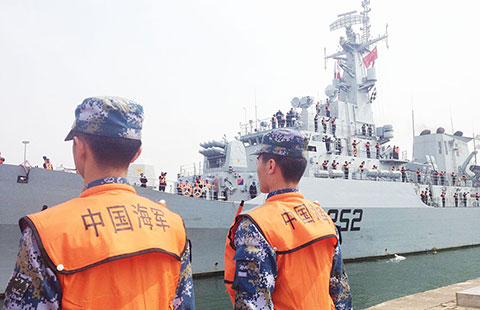Chinese experts help Argentina protect its fisheries
Updated: 2014-04-21 05:32
By Chris Davis in New York (China Daily Latin America)
|
||||||||
Despite being two very distant countries, Argentina and China are "like neighbors connected by the sea and connected by the heart of the fishing sectors," said Zhao Xingwu, director general of fisheries at China's Ministry of Agriculture.
Zhao was speaking as co-chair to a workshop of 15O Chinese entrepreneurs and officials and representatives of the Argentinean fishing industry held last week in the Chinese city of Guiyang as part of an ongoing cooperation.
Last year, Argentinean fisheries sent about 67,940 tons of seafood to the Chinese market, mainly shrimp, squid, fishmeal, frozen fish and fillets, at a cost of $137.45, according to the National Institute of Statistics and Census. Those figures represent an increase over 2012 of 77 percent in value and 79 percent in volume.
"The progress made to date on fisheries cooperation between the countries have been made possible due to the work, reliability and achievements made by the respective authorities in the framework of cooperation between the two countries," said seminar co-chair Nestor Miguel Bustamente, head of Argentina's Undersecretariat of Fisheries and Aquaculture.
The seminar was sponsored by the Chinese Overseas Fisheries Association (COFA), an organization founded in Beijing in 2012 to promote the sustainable and healthy development of China overseas fisheries, a move that was seen as a response to increasing worldwide competition and declining catches in Chinese waters.
At the time, China had 116 companies engaged in distant-water fisheries, and nearly 2,000 fishing vessels with various types of fishing gear plying the seven seas.
"China's consumption of aquatic products has been growing in recent years amid the rising population and rapid urbanization. However, the country's capacity on overseas fisheries is still lagging, compared with world levels," said Han Changfu, minister of agriculture at the time.
China's total annual catch from distant waters then was about 1.15 million tons, valued at $1.98 billion, COFA said.
"The establishment of the association is expected to promote closer cooperation among fishery companies to further expand the overseas market," he said.
Cooperation among fisheries and seafood markets could also help explain yesterday's news that the volume of shark fin products imported into Hong Kong in 2013 dropped to 5,412 tons from 8,285 tons the year before — a 34.7-percent decline, according to the Census and Statistics Department.
The World Wildlife Fund's Hong Kong branch added to those numbers the fact the re-export volumes of shark fin from Hong Kong overall were down 17.5 percent, with re-export to the Chinese mainland dropping a whopping 90 percent.
That, experts say, could have more to do with China's ongoing austerity campaign which was launched in 2013 and included a ban on consumption of shark fin soup at all government events, which seems to be having a profound impact.
Ricky Leung Lak-kee, chairman of the Hong Kong Marine Products Association, told Fish Information and Services that the shark fin industry had suffered a 60 percent decline in import prices and a 20 percent to 30 percent drop in business because of the fall in demand from the mainland.
Wild Aid estimates that at the height of the market, of the 100 million sharks killed every year, 73 million of them were for their fins to make soup in mainland China. A pair of shark fins at the time fetched more than $300 a pound in the Asia market.
Part of the credit for the drop could also be given to the grassroots organization Shark Savers, whose "I'm FINished with Fins" campaign in partnership with WildAid, National Geographic and the World Wildlife Fund was launched in Hong Kong, Malaysia, Singapore and Taiwan in 2012, and in the mainland in late 2013.
CITES, the Convention on International Trade in Endangered Species of Wild Fauna and Flora, recently announced that it would include more species of sharks on its Appendix II list, which will require more rigorous monitoring of the trade, including DNA sampling of fins to determine species and origin.
Leung insists that the fin trade was not endangering shark population, claiming that two-thirds of the imports to Hong Kong were fins taken from blue sharks, which are not on the endangered list.
The fishing area covered by China's COFA is vast, including agreements with 37 countries, stretching from Morocco to the Antarctic, as well as the blue waters of the Pacific, Atlantic and Indian oceans. And there are sharks in them all.
The kind of cooperation and exchange demonstrated by the Argentinean fishery delegation's trip to China, and the coming together of everyone wanting to protect the great resources of the sea, bodes well for the global pond.

 In photos: cars dazzle at Beijing Auto Show
In photos: cars dazzle at Beijing Auto Show
 Multinational drill to be held in East China port city
Multinational drill to be held in East China port city
 William, Kate visit Australian air force base
William, Kate visit Australian air force base
 Top 10 Chinese Internet firms eyeing IPOs in US
Top 10 Chinese Internet firms eyeing IPOs in US
 Google glass making profits in China
Google glass making profits in China
 BlackRock licensed to invest further in China using yuan
BlackRock licensed to invest further in China using yuan
 US Commerce chief vows trade growth
US Commerce chief vows trade growth
 UN hosts Chinese Language Day
UN hosts Chinese Language Day
Most Viewed
Editor's Picks

|

|

|

|

|

|
Today's Top News
Death toll of S. Korean ferry sinking rises to 33
New human H7N9 case reported
China on frontlines of cyber threat
China raises alert against cancer
Sunken ferry relatives give DNA swabs to help identify victims
Weibo, Leju go public in New York
Silicon mayors on mission to China
Hainan Air announces 1st Beijing to Boston directs
US Weekly

|

|








